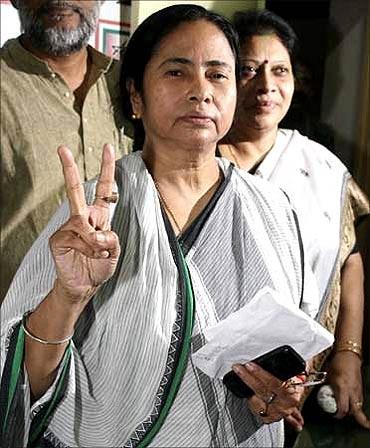
Harry Potter has serious competition his magic wand is now being waved by none other than Bengal's new messiah: she who must be named: Mamata Banerjee. In her first 30 days, with the flick of a wand, she has 'solved' Singur, Junglemahal and Darjeeling.
"I am slogging like a demon," Banerjee said recently. What she left out was that she's made sure that everyone at Writers' the red-bricked colonial structure that houses the state secretariat is doing the same.
If her predecessor, Buddhadeb Bhattacharjee's 'Do It Now' slogan was hated by Writers' employees, Banerjee's modified 'Do It Immediately' has become a nightmarish sequel, with the hours that her workers are putting in often stretching to 10pm.
The Chief Minister says she is willing to pay a price for decisions made in haste rather than sitting around and dithering over them.
...
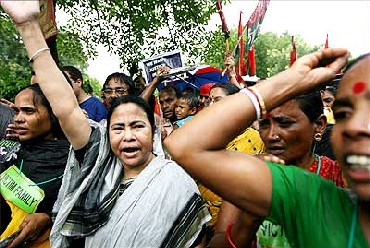
"I am in a hurry. I am ready to make mistakes and take lessons from them, rather than sit back and think, and waste five years doing nothing," the Chief Minister had said, unapologetically, after her first slip-up on the Singur ordinance led to its withdrawal, much to the embarrassment of the Governor.
But in her race against time, much of Banerjee's 200-day agenda, if not "solved", have been addressed in the first 100 days, or even earlier.
Land is closest to her heart; the agitation surrounding acquisition of land is what resurrected her political career, and Banerjee has enacted a payback of sorts.
One of the first things that she did after becoming CM was to form a committee to draft a land policy that legitimises her pre-election stand of non-government intervention in acquisition of land for industrial projects. The draft is now under government consideration.
...
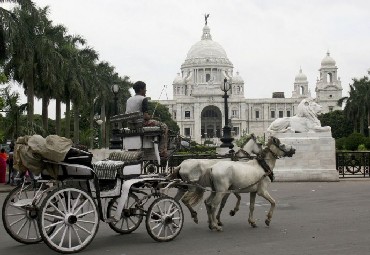
Not satisfied with just that, the government is also seeking records of land owned by industry in excess of the permissible 24 acres.
If possible, the government might just vest the excess land. Industry, isn't happy. "Land is the only thing this government has to offer, but they will not. The state will not see any big investment," an industry veteran said.
In the run-up to the assembly elections, Banerjee had struck a chord with Bengal's intelligentsia, many of whom joined the chorus to usher in "Paribartan" or political change in the state.
She has taken the symbiotic relationship a step further by making efforts to bring back the glory at Presidency University, Bengal's pride. A mentors' panel comprising Amartya Sen and Sugata Bose have been formed to revive the educational institution that had seen a decline in standards during the Left Front regime.
...
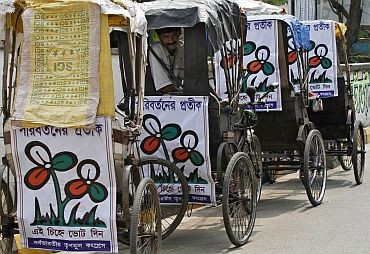
Other stalwarts who have been roped in to guide the state's resurgence: Sam Pitroda and N R Narayana Murthy who have been asked to head up information technology.
Other luminaries have made it to some-40 committees set up by the state government for different purposes.
Health, which is among the Chief Minister's many portfolios, has seen some key decisions: 3,500 beds will be added to state-run hospitals, four medical colleges are being planned and block-level diagnostic centres are under consideration.
"A large number of positive initiatives have been taken, but we feel 100 days is too short a time to get finite results. We are waiting and watching for something good to happen," Bengal Chamber of Commerce & Industry president, Sandipan Chakravortty, said.
...
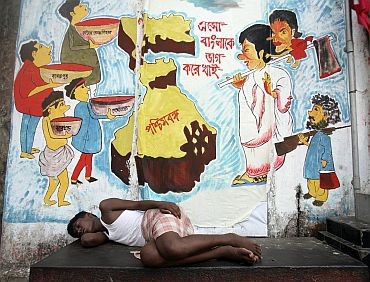
This is commendable stuff, yet a nagging question making the rounds is, "Where will the money come from?" Rough estimates indicate that decisions and special packages announced by Banerjee till July will cost the exchequer Rs 500 crore a month.
As a key ally in the UPA government, Banerjee has received a higher plan allocation, but according to her, it is only good enough to pay salaries for the next four to five months.
Populism can be an expensive device for a government faced with a gargantuan debt problem.
"She is eyeing low hanging fruits," a critic said. Bengal's villages will achieve 100 per cent electrification in three years, Banerjee has announced, but ruled out acquiring land for NTPC's power projects or, for the nuclear power project at Haripur.
...

The chemical hub project at Nayachar has been scrapped, as well. All three happen to be victims of the Trinamool Congress' pre-election stand.
But what has, perhaps, irked the industry most, is the government's decision to vest JSW Steel's land at Salboni and instead lease it to the company.
Others have watched this with apprehension. "We are going slow on our project. Let the government first settle down," says competitor Bhushan Steel managing director, Neeraj Singal whose company is supposed to set up a six million tonne steel project in Bengal, in partnership with Sumitomo.
...
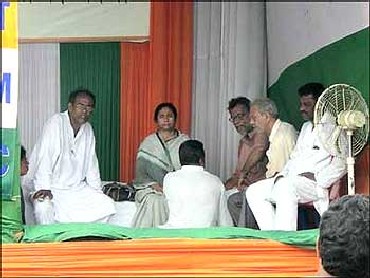
Consequently, the industry doesn't think there is much in it for them. "The attitude is, come and invest, but I have nothing to offer," rue industry representatives.
"The Chief Minister doesn't have time for industry meets, but she finds time for cultural programmes," they said.
Banerjee's is the most visible face around after all, and can beat any celebrity hollow. She rarely misses a cultural show; it's also a portfolio she handles.
Banerjee has taken it upon herself to popularise Rabindranath Tagore. And Tagore is omnipresent: at bus stops, traffic signals and hoardings in Kolkota.
If she continues at this scorching pace, she may even have a song or two written about her although she can be assured it won't be sung by industry.
...
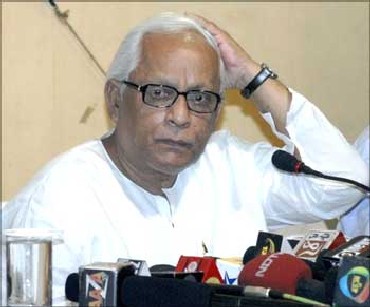
Azim Premji thought Buddhadeb Bhattacharjee was the best Chief Minister that Bengal ever had. Not without reason: The first file he signed after taking charge was land allotment to Wipro.
Clearly, Bhattacharjee's first 100 days and his successor, Mamata Banerjee's, are a study in contrast. Bhattacharjee was singularly focused on wooing back industry to correct years of the Left Front's excesses that had made Bengal an industry graveyard.
Adopting a "Do It Now" mantra, he set out to bag investments and in the first 100 days snagged Wipro, initiated dialogue with Satyam and set up an information technology department.
Investment proposals like Mitsubishi Chemicals' expansion and South Asian Petrochemicals came Bhattacharjee's way in the first week.
...

"He was completely focused on the industry. The objective was to growth the wealth of the state," Bengal Chamber of Commerce & Industry president, Sandipan Chakravortty, said.
The red-bricked colonial state secretariat, seemingly caught in a time warp, saw the first shake-up in Bhattacharjee's time. Orders were issued asking the staff to be punctual and no employee could leave before closing hour.
Productivity-assessment reports, it was decided, needed to be filed. Within the first few days, Bhattacharjee sent out strong signals to the trade unions that their days of militancy were history. Employees should co-operate with the industry, he had said, on his second day in office.
Ironically, it was Bhattacharjee's industry focus that ultimately boomeranged. On the other hand, Banerjee's focus is multi-faceted, where industry is in the lower rungs. And although the troika - Singur, Junglemahal and Darjeeling - are far from "solved" the days that stretch ahead hold promise.